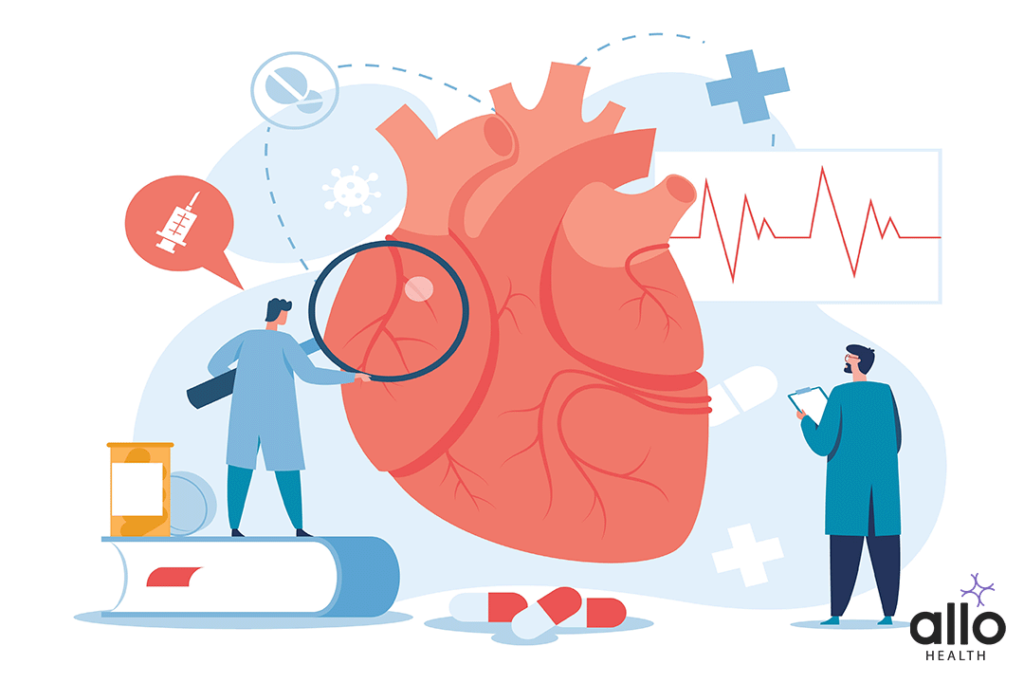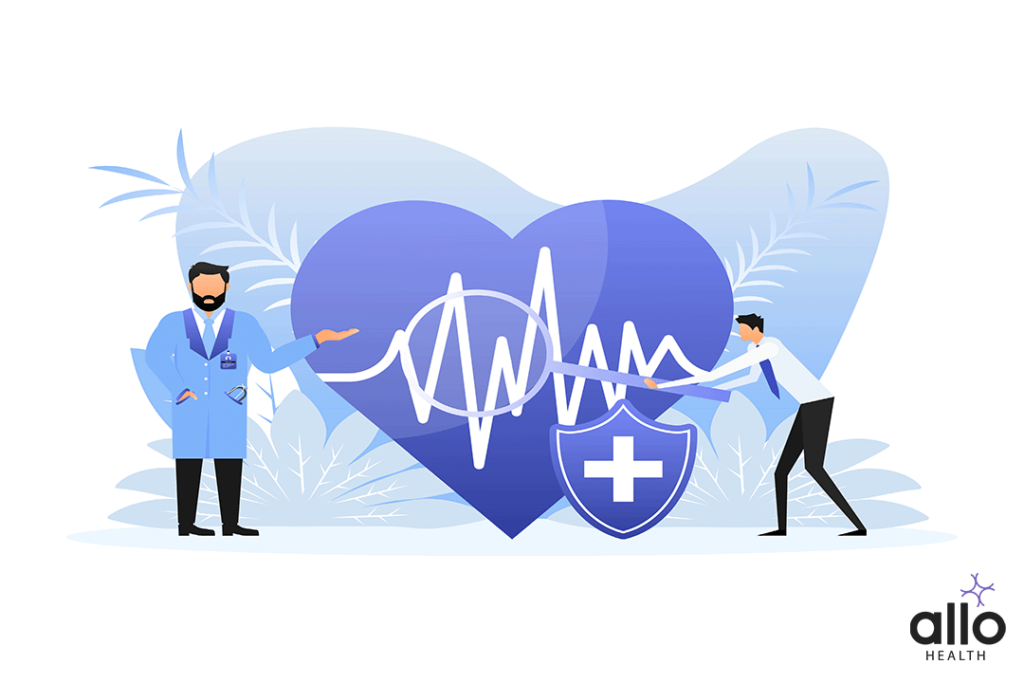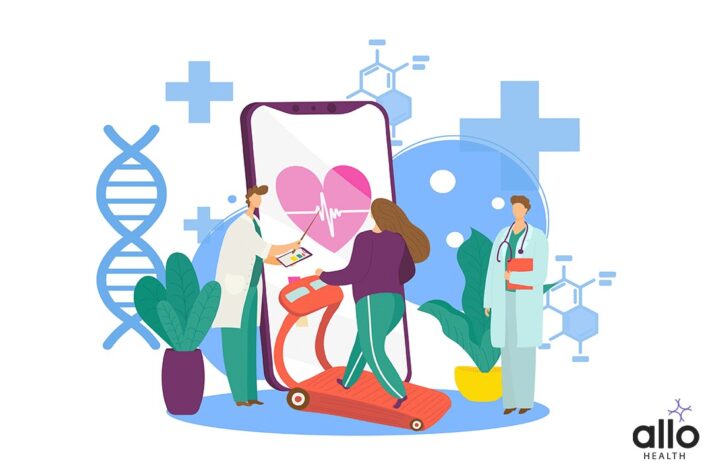Sex and Cardiovascular Disease: Managing Sexual & Heart Health

Allo Health is dedicated to personalized well-being, offering support and trusted information tailored to individual health goals. The platform emphasizes human-generated content, led by a distinguished medical team of experts, including physicians and sexual health specialists. Their commitment to credibility involves rigorous fact-checking, authoritative research, and continuous updates to ensure accurate, up-to-date information. Allo Health's unique approach goes beyond conventional platforms, providing expert-led insights and a continuous commitment to excellence, with user feedback playing a crucial role in shaping the platform's authoritative voice.

Ms Rachel graduated with a MSc. in clinical psychology from CMR university, Bangalore. With close to two years of experience in the field of Child and Adolescent Psychology.

Anoush Gomes is a seasoned Content Writer with over 10 years of experience, specializing in various writing styles such as medical content, creative writing, storytelling, and research papers. Anoush embarked on a unique journey, starting with pre-medical studies at the Dante Aligheri Academy and the University of Miami, where she earned a Bachelor's degree with a major in Biology and a minor in Psychology. Having pursued medical school and completed clinicals, Anoush transitioned to the world of medical content writing, where her passion for both healthcare and writing converged. Her writing skills encompass persuasive, narrative, expository, and descriptive styles, making complex medical concepts accessible to diverse audiences. Beyond her professional endeavors, Anoush is a multi-faceted individual with a rich tapestry of interests. A writer, artist, poet, avid reader, certified nerd, and hopeful author, she finds inspiration in the intersection of creativity and science. Whether crafting engaging medical narratives or weaving captivating stories, Anoush combines her diverse background and writing expertise to deliver compelling content that resonates with diverse audiences.
Why This Was Upated?
Our experts continually monitor the health and wellness space, and we update our articles when new information became available.
Updated on 27 May, 2024
- Article was updated as part of our commitment to diversity, equity, and inclusion.

"The following blog article provides general information and insights on various topics. However, it is important to note that the information presented is not intended as professional advice in any specific field or area. The content of this blog is for general educational and informational purposes only.
Book consultation
The content should not be interpreted as endorsement, recommendation, or guarantee of any product, service, or information mentioned. Readers are solely responsible for the decisions and actions they take based on the information provided in this blog. It is essential to exercise individual judgment, critical thinking, and personal responsibility when applying or implementing any information or suggestions discussed in the blog."
"The following blog article provides general information and insights on various topics. However, it is important to note that the information presented is not intended as professional advice in any specific field or area. The content of this blog is for general educational and informational purposes only.
Book consultation
The content should not be interpreted as endorsement, recommendation, or guarantee of any product, service, or information mentioned. Readers are solely responsible for the decisions and actions they take based on the information provided in this blog. It is essential to exercise individual judgment, critical thinking, and personal responsibility when applying or implementing any information or suggestions discussed in the blog."
Cardiovascular disease, also known as heart disease, is a condition that affects the heart and blood vessels. It is a leading cause of death worldwide, with an estimated 17.9 million deaths in 2019. While the main focus of cardiovascular disease management is on preventing heart attacks and strokes, it is also important to understand the impact of the disease on sexual health.
What is Cardiovascular Disease?
Cardiovascular disease refers to a range of conditions that affect the heart and blood vessels. These conditions can include coronary artery disease, heart failure, arrhythmias, and valvular heart disease. The most common cause of cardiovascular disease is atherosclerosis, which is the buildup of fatty deposits in the walls of the arteries. This buildup can lead to a narrowing of the arteries and reduced blood flow to the heart and other organs.
Types of Cardiovascular Disease
- Coronary artery disease is the most common type of cardiovascular disease. It occurs when the coronary arteries, which supply blood to the heart, become narrow or blocked due to a buildup of plaque. This can lead to chest pain or angina, heart attacks, and heart failure.
- Heart failure occurs when the heart is unable to pump enough blood to meet the body’s needs. It can be caused by a variety of factors, including coronary artery disease, high blood pressure, and diabetes.
- Arrhythmias are abnormalities in the heart’s rhythm. They can cause the heart to beat too fast, too slow, or irregularly. While many arrhythmias are harmless, some can be life-threatening.
- Valvular heart disease occurs when the heart valves do not function properly. This can cause the heart to work harder to pump blood and can lead to heart failure.
Risk Factors of Cardiovascular Disease
Cardiovascular disease (CVD) refers to a group of disorders that affect the heart and blood vessels, including coronary artery disease, heart failure, stroke, and peripheral artery disease. Some of the major risk factors associated with the development of CVD include:
Age: The risk of developing CVD increases with age.
Gender Differences: Men are more likely to develop CVD than premenopausal women. However, after menopause, the risk for women becomes similar to that of men.
Family history: If you have a family history of CVD, you are at a higher risk of developing the condition.
Smoking: Cigarette smoking is a major risk factor for CVD.
High blood pressure: High blood pressure or hypertension can damage the blood vessels and increase the risk of developing CVD.
High cholesterol: High levels of cholesterol in the blood can lead to the buildup of plaque in the arteries, which can increase the risk of heart disease and stroke.
Obesity: Being overweight or obese increases the risk of developing CVD.
AdvertisementsDiabetes: Diabetes can damage the blood vessels and increase the risk of developing CVD.
Sedentary lifestyle: Lack of physical activity can increase the risk of developing CVD.
Stress: Chronic stress can increase the risk of developing CVD by raising blood pressure and increasing inflammation in the body.
Symptoms of Cardiovascular Disease
Cardiovascular disease (CVD) refers to a group of conditions that affect the heart and blood vessels, including coronary artery disease, heart failure, arrhythmias, and stroke. The symptoms of CVD can vary depending on the specific condition, but some common symptoms include:
Chest pain or discomfort: This is a common symptom of coronary artery disease and may feel like pressure, squeezing, fullness, or burning in the chest.
Shortness of breath: This may be a sign of heart failure or a heart attack and can occur during physical activity or at rest.
Fatigue: Feeling tired or weak can be a symptom of several different types of CVD.
Swelling: Swelling in the legs, ankles, or feet can be a sign of heart failure.
Palpitations: This refers to a fluttering or pounding sensation in the chest and can be a sign of an arrhythmia.
Dizziness or lightheadedness: This can be a symptom of several different types of CVD, including arrhythmias or aortic stenosis.
Nausea or vomiting: These symptoms can occur during a heart attack or heart failure.
Diagnosis of Heart Disease

The diagnosis of cardiovascular disease (CVD) involves a combination of physical examination, medical history, and diagnostic tests. Some common tests that may be used to diagnose CVD include:
Electrocardiogram (ECG or EKG): This test records the electrical activity of the heart and can detect abnormal rhythms, damage to the heart muscle, and other concerns.
Echocardiogram: This test uses ultrasound waves to create images of the heart and can detect concerns with the heart valves, the size of the heart, and other concerns.
Stress tests: These tests involve monitoring the heart during exercise to see how it responds to physical activity. There are different types of stress tests, including treadmill tests and pharmacologic stress tests.
Blood tests: Blood tests can measure cholesterol levels, blood sugar levels, and other markers that can indicate the presence of CVD.
Cardiac catheterization: This test involves inserting a small tube (catheter) into a blood vessel and threading it to the heart to measure pressure and check for blockages.
CT angiography: This test involves injecting a dye into the blood vessels and using a CT scanner to create images of the heart and blood vessels.
MRI: This test uses a magnetic field and radio waves to create detailed images of the heart and blood vessels.
The specific tests that are used to diagnose CVD will depend on the patient’s symptoms, medical history, and risk factors. A cardiologist is a specialist who can help diagnose and treat CVD.
Biology of Cardiovascular Disease That Affects Sexual Health
The link between cardiovascular disease and sexual health is complex and multifactorial. Cardiovascular disease can affect sexual health in a number of ways, including:
Reduced Blood Flow: Cardiovascular disease can lead to reduced blood flow to the genital area, which can affect sexual arousal and function.
Medications: Medications used to treat cardiovascular disease, such as beta-blockers and diuretics, can cause sexual side effects.
Psychological Factors: Cardiovascular disease can cause anxiety and depression, which can affect sexual health.
Hormonal Imbalances: Cardiovascular disease can disrupt hormonal balances in the body, which can affect sexual function.
Symptoms of Cardiovascular Disease That Affect Sexual Health
Some symptoms of cardiovascular disease can affect sexual health. For example, angina, which is chest pain caused by reduced blood flow to the heart, can cause anxiety and make it difficult to relax during sexual activity. Erectile dysfunction, which is the inability to achieve or maintain an erection, can be a sign of cardiovascular disease. Other symptoms that can affect sexual health include shortness of breath, fatigue, and palpitations.
Sexual Dysfunctions Caused by Cardiovascular Disease
Cardiovascular disease can cause a range of sexual dysfunctions, including:
Erectile Dysfunction: Erectile dysfunction is the most common sexual dysfunction in men with cardiovascular disease. It is caused by reduced blood flow to the penis, which can occur due to atherosclerosis or other cardiovascular conditions.
Premature Ejaculation: Cardiovascular disease can cause premature ejaculation, which is the inability to control ejaculation during sexual activity.
Delayed Ejaculation: Delayed ejaculation is a condition in which it takes a long time to achieve ejaculation or it is difficult to achieve ejaculation. Cardiovascular disease can cause this condition due to reduced blood flow to the genital area.
Sexual Arousal Disorder: Cardiovascular disease can affect sexual arousal in both men and women. This can be caused by reduced blood flow to the genital area or by psychological factors such as anxiety or depression.
Types of Sexual Dysfunction in Men with Cardiovascular Disease
Erectile Dysfunction (ED) is the most common sexual dysfunction in men with cardiovascular disease. It is estimated that up to 75% of men with heart disease also have ED. ED can be caused by a number of factors, including reduced blood flow to the penis, nerve damage, and hormonal imbalances. Men with cardiovascular disease are also more likely to experience premature ejaculation and delayed ejaculation.
Cardiovascular disease (CVD) can cause erectile dysfunction (ED) in a few different ways:
Reduced blood flow: CVD can cause atherosclerosis, which is a buildup of plaque in the arteries that can restrict blood flow. This can limit the amount of blood that reaches the penis during sexual arousal, which can make it difficult to achieve or maintain an erection.
Damage to blood vessels and nerves: CVD can damage the blood vessels and nerves that are involved in the process of getting an erection. This can lead to decreased sensitivity in the penis and a reduced ability to achieve or maintain an erection.
Psychological effects: CVD can cause psychological stress and anxiety, which can make it more difficult to get an erection. This can create a cycle where ED leads to further stress and anxiety, which can worsen the ED.
It’s worth noting that ED can be an early warning sign of CVD, as the same underlying factors (such as high blood pressure, high cholesterol, and diabetes) that contribute to CVD can also contribute to ED. If you are experiencing ED, it’s important to talk to your healthcare provider to determine the underlying cause and develop an appropriate treatment plan.
Types of Sexual Dysfunction in Women with Cardiovascular Disease
Cardiovascular disease can affect sexual function in women in several ways. One of the main ways is by reducing blood flow to the genitals, which can lead to difficulties with arousal, vaginal dryness, and difficulty achieving orgasm. Here are some possible mechanisms:
Reduced blood flow to the genitals: Cardiovascular disease can cause narrowing of the blood vessels that supply blood to the genital area. This can lead to reduced blood flow to the clitoris and vagina, making it harder to become sexually aroused and achieve orgasm.
Medications: Women with cardiovascular disease may be taking medications, such as beta blockers, that can also affect sexual function. These medications can reduce blood flow to the genitals and decrease libido.
Hormonal changes: Cardiovascular disease can also cause hormonal imbalances that affect sexual function. For example, the production of estrogen may decrease, leading to vaginal dryness and discomfort during sex.
Psychological factors: Women with cardiovascular disease may experience anxiety, depression, or other psychological concerns. that can affect sexual function.
Psychological Effects of Sex and Cardiovascular Disease
Sex and cardiovascular disease (CVD) can have several psychological effects on individuals. Here are some of them:
Anxiety and Depression: People with CVD may experience anxiety and depression related to their condition. Fear of having another heart attack or stroke can lead to anxiety, and the limitations imposed by CVD, such as decreased sexual function, can lead to depression.
Sexual dysfunction: CVD can cause sexual dysfunction, such as erectile dysfunction in men and reduced sexual desire and arousal in women. This can affect the individual’s self-esteem and self-image, leading to anxiety and depression.
Relationship concerns.: CVD can affect the individual’s relationship with their partner. The limitations on physical activity and sexual function can cause stress and tension in the relationship. The partner may also feel anxiety and stress about the individual’s health.
Poor quality of life: CVD can affect the individual’s quality of life, leading to feelings of sadness, hopelessness, and helplessness.
Fear of recurrence: People with CVD may worry about the recurrence of the disease, leading to anxiety and depression.
Managing Cardiovascular Disease and Sexual Health

Managing cardiovascular disease and sexual health requires a comprehensive approach that addresses both the physical and psychological aspects of sexual health. Some strategies for managing sexual health while living with cardiovascular disease include:
Communication: Open communication with your healthcare provider and your partner is important for managing sexual health. Your healthcare provider can help you understand the impact of cardiovascular disease on sexual health and recommend strategies for managing sexual dysfunction. Talking to your partner can help reduce anxiety and improve intimacy.
Lifestyle Changes: Lifestyle changes such as quitting smoking, eating a healthy diet, and exercising regularly can improve cardiovascular health and reduce the risk of sexual dysfunction.
Medications: Medications such as phosphodiesterase type 5 inhibitors (PDE5 inhibitors) can be used to treat erectile dysfunction in men with cardiovascular disease. However, these medications should only be used under the guidance of a health care provider.
Psychological Counseling: Cardiovascular disease can cause anxiety and depression, which can affect sexual health. Psychological counseling can help address these concerns. and improve sexual function.
Sexual Therapy: Sexual therapy can be helpful for couples experiencing sexual dysfunction. It can help address communication concerns. and improve intimacy.
Medications Given to Those With Sexual Health Conditions And Cardiovascular Disease
Medications used to treat sexual dysfunction, such as PDE5 inhibitors, can interact with medications used to treat cardiovascular disease. For example, PDE5 inhibitors can interact with nitrate medications used to treat angina and cause a dangerous drop in blood pressure. For this reason, it is important to discuss the use of these medications with your healthcare provider.
Phosphodiesterase type 5 (PDE5) inhibitors: These drugs, such as sildenafil (Viagra), tadalafil (Cialis), and vardenafil (Levitra), are commonly prescribed for erectile dysfunction. They work by increasing blood flow to the penis, which can help improve erections. However, they can also lower blood pressure, so they should be used with caution in individuals with cardiovascular disease.
Nitrate medications: These drugs, such as nitroglycerin, are commonly used to treat angina (chest pain) caused by cardiovascular disease. They work by relaxing the blood vessels and increasing blood flow to the heart. However, they can also lower blood pressure, so they should not be used with PDE5 inhibitors.
Beta-blockers: These drugs, such as metoprolol and atenolol, are commonly used to treat high blood pressure and other cardiovascular conditions. They work by reducing the workload on the heart and lowering heart rate. However, they can also cause erectile dysfunction as a side effect.
Anticoagulants: These drugs, such as warfarin and heparin, are commonly used to prevent blood clots in individuals with cardiovascular disease. They work by thinning the blood and preventing clots from forming. However, they can also increase the risk of bleeding, which can be a concern during sexual activity.
Complications with Cardiovascular Disease
There are many different types of complications associated with cardiovascular disease (CVD), some of which include:
Heart failure: This is a condition where the heart is unable to pump blood effectively to meet the body’s needs. It can be caused by various types of CVD, such as coronary artery disease, high blood pressure, or heart valve disease.
Stroke: This occurs when there is a disruption of blood flow to the brain, either due to a blood clot or bleeding in the brain. CVD can increase the risk of stroke, particularly if it is left untreated or poorly managed.
Peripheral artery disease: This is a condition where there is a narrowing or blockage of the blood vessels in the legs or arms, leading to decreased blood flow to these areas. It is often caused by atherosclerosis, which is the buildup of plaque in the arteries.
Aneurysm: This is a bulging or weakened area in the wall of a blood vessel, which can be caused by various types of CVD, such as high blood pressure or atherosclerosis. If an aneurysm ruptures, it can be life-threatening.
Arrhythmias: These are abnormal heart rhythms that can be caused by various types of CVD, such as heart valve disease or a previous heart attack. Some arrhythmias can be life-threatening and require urgent treatment.
Cardiac arrest: This occurs when the heart suddenly stops beating, often due to a problem with the heart’s electrical system. It is a medical emergency that requires immediate treatment.
Pulmonary embolism: This is a blockage of the blood vessels in the lungs, which can be caused by a blood clot that has traveled from another part of the body, such as the legs. CVD can increase the risk of developing a pulmonary embolism.
These are just a few examples of the many complications associated with CVD. Working closely with a healthcare provider to manage any existing CVD and reduce the risk of developing complications is the right way forward.
Types of Cardiovascular Disease Treatment
The treatment of cardiovascular disease depends on the type and severity of the condition. Some common treatments include:
Lifestyle Changes: Lifestyle changes such as quitting smoking, eating a healthy diet, and exercising regularly can improve cardiovascular health and reduce the risk of complications.
Medications: Medications such as beta-blockers, diuretics, and ACE inhibitors can be used to treat cardiovascular disease.
Surgery: Surgery may be necessary to treat certain types of cardiovascular disease, such as coronary artery disease or valvular heart disease.
Medical Devices: Medical devices such as pacemakers or implantable cardioverter-defibrillators (ICDs) may be used to treat certain types of arrhythmias.
Conclusion
Cardiovascular disease is a common condition that affects millions of people worldwide. It can have a significant impact on sexual health, causing a range of sexual dysfunctions in both men and women. However, there are strategies that can be used to manage sexual health while living with cardiovascular disease, including communication, lifestyle changes, medications, psychological counseling, and sexual therapy.






































